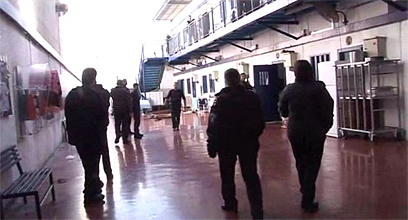
'Prisoner Rehabilitation Authority collapsing'
Insufficient budget, legislative delays are threatening organization's future. Chief Public Defender says shutdown would be 'crime against Israel's weakest population'
The budget it frozen, the director-general has resigned and the Prisoner Rehabilitation Authority is collapsing, Chief Public Defender Dr. Yoav Sapir warned Monday in an urgent letter to senior government officials.
According to Sapir, 2,500 prisoners are denied parole each year because there are insufficient funds to rehabilitate them.
Related stories:
- Qalqilya woman: I felt like Palestinian prisoners
- 'Integrate Arab prisoners into minority aid plans'
- Report: Worrisome findings at Israeli prisons
The letter, sent to Finance Minister Yuval Steinitz, Welfare Minister Moshe Kahlon, and Attorney-General Yehuda Weinstein, states that "the years of frozen budgets for the authority has led us to the verge of collapse."
Sapir said he was compelled to warn them that the PRA could be forced to stop its activity.
"I'm appealing to you because of the harm done to thousands of prisoners who are denied proper rehabilitation and in the public interest of preventing crimes from passing the statute of limitations, as well as the waste of resources caused by lack of rehabilitation," the chief public defender wrote.

Inside the Maatisyahu Prison. (Photo: Eli Mandelbaum, IPA)
"All these are cause by a lack of necessary funding for the Prisoner Rehabilitation Authority," the letter stressed.
The situation in the PRA prompted director-general Dr. Haim Iluz to submit his resignation to Kahlon two weeks ago. "I am doing this with a heavy heart, after taking on the job out of a sense of public service," Iluz told Ynet, adding that the authority's budget had not changed for a decade, despite increased expenditures and the "growing needs of the prisoners undergoing rehabilitation."
Since 1983, the Prisoner Rehabilitation Authority has operated under the auspices of the Parole Law, which codified the issue of parole and set guidelines for parole boards. Among other issues, the authority is charged with helping prisoners re-integrate into society, developing the services available to parolees and coordinating between government offices, local authorities, and other relevant entities.
"The main task of the authority is to protect society from crime, and rehabilitation is secondary," Eiloz explained. "We showed the Treasury that with our unbelievably small budget of NIS 14 million, we save society some NIS 300 million in crime costs."
Sapir added that budget strictures prevented the parole of some 2,500 prisoners a year and allowed for coordinators to operate in only 46 communities, rather than in 240.
"This is a crime the Treasury is committing against the weakest population of Israel and against the Israeli public. It's contemptible that a statutory body in Israel can't carry out its legislated mandate," Iluz declared.
These problems, along with drawn-out legal proceedings to accommodate the Treasury's demand that the authority's standing be regularized, have caused a crisis that could bring the PRA's activity to a halt. This would mean that the parolees for whom the authority is responsible would face new parole hearings, new parolees wouldn't be eligible for rehabilitation, and the committee responsible for drawing up rehabilitation programs would cease to operate.
Kahlon also addressed the budget crisis in a letter he sent last week to the head of the Finance Ministry's Budget Division Chief, Gal Hershkovitz. Kahlon said that the PRA's budget had not been adjusted despite his repeated requests, and added that since it did not appear that the Finance Ministry intended to change its position on allocating the necessary funds for the PRA, he was "informing them that the responsibility now falls on the Treasury's shoulders."
The Finance Ministry said in response that "Two years ago, the Welfare Ministry initiated reforms to the Prisoner Rehabilitation Authority to improve its rehabilitation of prisoners. Therefore, it was decided to execute a reform that would integrate the PRA into the Welfare Ministry to improve the authority's management and create synergy in the Welfare Ministry's activity while increasing the funds devoted to prisoner rehabilitation."
"Unfortunately, for various reasons the reforms weren't put in place and the situation remains as it was. However, the Welfare Ministry can back up the Prisoner Rehabilitation Authority from the budget it was allotted by the Knesset for 2011-2012."
- Receive Ynetnews updates directly to your desktop










